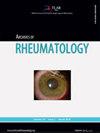转归评估中的文化差异:对土耳其风湿病患者的 TRANSITION-Q 和 STARx 量表进行评估
IF 1.1
4区 医学
Q4 Medicine
引用次数: 0
摘要
研究目的本研究旨在评估我们的患者群体在转入成人护理方面的准备情况,以及 TRANSITION-Q 和 STARx 量表在土耳其青少年患者群体中的适用性。患者和方法:在 2021 年 9 月 15 日至 2021 年 12 月 15 日期间,共有 153 名患者(92 名男性,61 名女性;平均年龄:15.5±1.9 岁;年龄范围:12 至 18 岁)参与研究。患者按年龄分为两组:12 至 15 岁和 16 至 18 岁。患者还根据诊断分为四组:结缔组织疾病、幼年特发性关节炎、血管炎和自身炎症性疾病。TRANSITION-Q 和 STARx 量表由一名护士和一名医生面对面实施。根据得分评估患者的过渡准备情况。结果显示69名(45%)患者年龄在12至15岁之间,84名(55%)患者年龄在16至18岁之间。84名(54.9%)患者患有幼年特发性关节炎,47名(30.7%)患者患有自身炎症,14名(9.2%)患者患有血管炎,8名(5.2%)患者患有结缔组织疾病。在两种量表中,不同疾病组别和性别的量表得分没有明显差异。考虑到患者的年龄,16 至 18 岁年龄组患者的 TRANSITION-Q 量表(74.3±13.3 vs. 65.4±9.6,p<0.001)和 STARx 量表(51.8±8.1 vs. 44.8±9.1,p<0.001)的平均得分明显高于 12 至 15 岁年龄组。STARx 量表的 Cronbach's alpha 得分为 0.71,TRANSITION-Q 量表的 Cronbach's alpha 得分为 0.79。结论TRANSITION-Q量表和STARx量表可指导土耳其患者确定过渡前的需求,规划个性化的过渡过程。本文章由计算机程序翻译,如有差异,请以英文原文为准。
The cultural differences in transition assessment: Evaluation of TRANSITION-Q and STARx scales on Turkish rheumatic patients
Objectives: This study aimed to assess the readiness of our patient population for the transfer to adult care and the applicability of the TRANSITION-Q and STARx scales to the Turkish adolescent patient population.
Patients and methods: A total of 153 patients (92 males, 61 females; mean age: 15.5±1.9 years; range, 12 to 18 years) were included in the study between September 15, 2021, and December 15, 2021. The patients were divided into two groups according to age groups: 12 to 15 years old and 16 to 18 years old. The patients were also divided into four groups according to their diagnosis: connective tissue diseases, juvenile idiopathic arthritis, vasculitis, and autoinflammatory diseases. The TRANSITION-Q and STARx scales were administered face-to-face by a nurse and a doctor. The transition readiness of the patients was evaluated according to their scores.
Results: Sixty-nine (45%) patients were in the 12 to 15 age group, and 84 (55%) were in the 16 to 18 age group. Eight-four (54.9%) patients had juvenile idiopathic arthritis, 47 (30.7%) patients had an autoinflammatory disease, 14 (9.2%) patients had vasculitis, and eight (5.2%) patients had a connective tissue disease. There was no significant difference in the scale scores according to disease groups and sexes in both scales. Considering the age of the patients, the mean scores of the patients in the 16 to 18 age group were found to be significantly higher compared to the 12 to 15 age group for both the TRANSITION-Q (74.3±13.3 vs. 65.4±9.6, p<0.001) and STARx scales (51.8±8.1 vs. 44.8±9.1, p<0.001). Cronbach's alpha score was 0.71 for the STARx scale and 0.79 for the TRANSITION-Q scale.
Conclusion: TRANSITION-Q and STARx scales could guide the Turkish patient population in determining the pretransition needs of patients in planning individualized transition processes.
求助全文
通过发布文献求助,成功后即可免费获取论文全文。
去求助
来源期刊

Archives of rheumatology
Medicine-Rheumatology
CiteScore
2.00
自引率
9.10%
发文量
15
期刊介绍:
The Archives of Rheumatology is an official journal of the Turkish League Against Rheumatism (TLAR) and is published quarterly in March, June, September, and December. It publishes original work on all aspects of rheumatology and disorders of the musculoskeletal system. The priority of the Archives of Rheumatology is to publish high-quality original research articles, especially in inflammatory rheumatic disorders. In addition to research articles, brief reports, reviews, editorials, letters to the editor can also be published. It is an independent peer-reviewed international journal printed in English. Manuscripts are refereed by a "double-blind peer-reviewed" process for both referees and authors.
Editorial Board of the Archives of Rheumatology works under the principles of The World Association of Medical Editors (WAME), the International Council of Medical Journal Editors (ICMJE), and Committee on Publication Ethics (COPE).
 求助内容:
求助内容: 应助结果提醒方式:
应助结果提醒方式:


